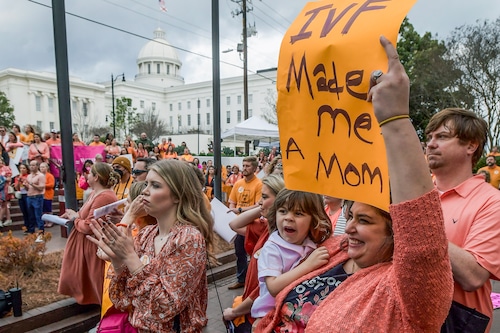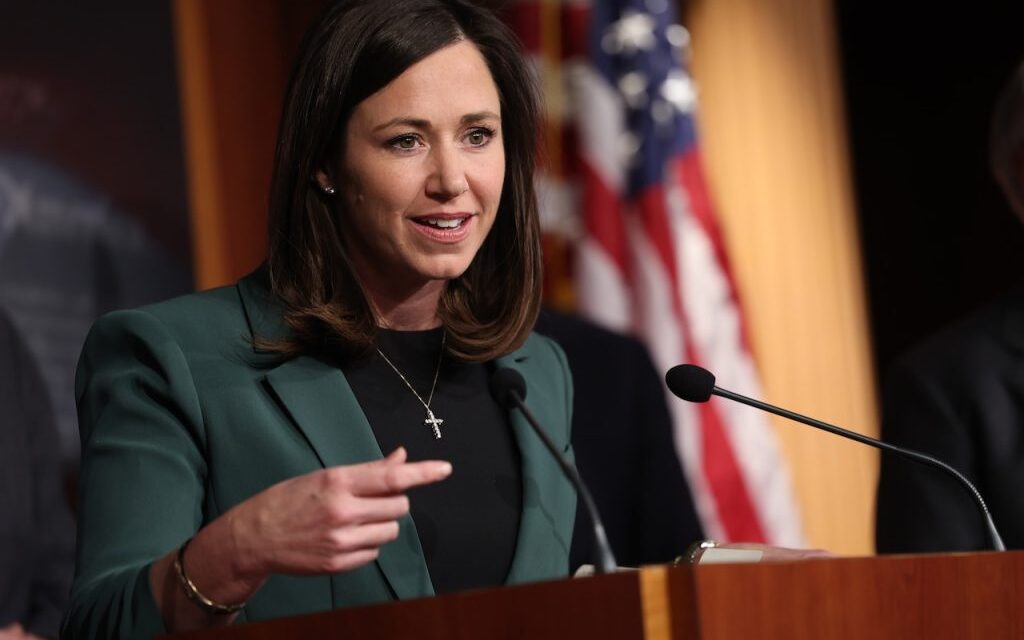By John Sharp
Federal legislation backed by Republicans, and twice defeated in the U.S. Senate since June, puts Medicaid funding for states in the crosshairs of the debate over in vitro fertilization – one of the hottest political issues born out of Alabama’s highest court.
The IVF Protection Act, co-sponsored by Republican U.S. Senator Katie Britt of Alabama, would bar states from receiving federal Medicaid dollars if they were to prohibit the procedure.
Critics of the IVF Protection Act say there are too many unknowns behind the legislation including the definition of what in vitro fertilization “prohibition” means, and whether tying Medicaid to the issue could create additional worries for 1 million low-income Alabama residents who rely on Medicaid.
Britt and GOP proponents defend the bill, saying Medicaid isn’t really in danger because there are no states, including Alabama, poised to ban IVF – a fertility treatment where eggs are combined with sperm outside the body in a lab to form an embryo.
Republicans also say their bill, and not one pitched by the Senate Democrats that provides blanket federal protections for IVF treatments, offers the best chances to both protect the procedure while safeguarding “religious liberty.”
The Republican “IVF Protection Act” doesn’t specifically mention religious liberty but says the act would not “compel any individual or organization to provide in vitro fertilization services.”
Meanwhile, Democrats back the “Right to IVF Act” which calls for a statutory right to access fertility treatments but does not tie Medicaid funding as a condition. That act would supersede state laws that limit fertility treatments, including laws that restrict the ability of individuals to receive fertility treatments based on marital status or sex, including sexual orientation or gender identity – a provision opposed by Republicans.
Both the Democrats’ and the Republicans’ bills were again shot down in U.S. Senate votes last week.
Prohibition and worries
Alabama has been Ground Zero in the nation’s IVF debate over the past year. And it’s where 21% of the overall population covered by Medicaid and the Children’s Health Insurance Program (CHIP) could lose their health coverage if the Republican backed “IVF Protection Act” was approved and if there was later a determination that the state was banning the procedure.
“The death knell to this state would be a ban” on Medicaid, said Sheena Gamble, spokesperson with the Alabama Democratic Party.
The criticism isn’t just from the Democrats. The Heritage Foundation, among the most conservative and controversial think tanks in the country, is raising doubts over what an IVF “prohibition” means under Britt’s legislation.
According to a May analysis by the Heritage Foundation – the same organization criticized for its Project 2025 policy document — the bill backed by Britt and Texas Republican Sen. Ted Cruz fails to outline where prohibition ends, and acceptable regulation begins.
Alina Salganicoff, Senior Vice President and Director of Women’s Health Policy at KFF – a nonprofit health policy research, polling, and news organization – said it’s hard to think about what is meant from a complete revocation of Medicaid to low-income residents if that determination was connected to a state’s IVF ban.
“It’s critical to low-income people particularly for children, pregnant women and seniors,” she said. “I don’t know of any state that has proposed to ban IVF, but this law doesn’t guarantee a right to IVF. And because of what happened in Alabama, people have begun to pay attention.”
Worries continue in Alabama over the fate of a procedure that accounts for approximately 2% of births in the U.S. and remains extremely costly and out of reach for many low-income people who need the technology to start or grow families. Depending on one’s needs, an IVF cycle can cost as much as $30,000.

AshLeigh Durham, a family attorney based in Hoover, said IVF remains in jeopardy in Alabama, despite efforts by lawmakers to protect it following the Alabama State Supreme Court’s controversial decision in February.
She said one of her biggest concerns include a rise of states introducing so-called “personhood legislation” by religious conservatives to grant embryos the same rights as children.
The legislation pitched in Alabama and other states like Iowa and Mississippi, would follow the Alabama State Supreme Court’s ruling that frozen embryos used during IVF were protected under the state’s wrongful death law.
“Any senator who is acting like IVF isn’t at risk is gaslighting their citizens,” Durham said. “IVF is at risk. If embryos are given the same rights as a person, we are looking at no longer having the ability to freeze them, genetically test them, destroy the ones that are not compatible with life, or many of the other ways we utilize IVF healthcare in order to allow families to procreate, the ability to continue to procreate.”
Uncertainty

Legal uncertainty in Alabama abounds. As reported by The New York Times last month, a handful of the state’s seven fertility clinics were moving embryonic cells out of the state to have them stored or potentially discarded elsewhere. Huntsville Reproductive Medicine, which operated for 20 years, announced it was closing in January.
The uncertainty exists despite the Alabama Legislature’s action in March to grant legal immunity to IVF providers. The Legislature’s actions occurred amid swift backlash to the high court’s ruling that included a highly religious opinion from Chief Justice Tom Parker.
Since then, one of the couples whose lawsuit paved the way for the Alabama Supreme Court decision, is moving forward with a case asking a Mobile County Circuit Court judge to find the Legislature’s immunity law unconstitutional. The Alabama State Supreme Court could, once again, get involved in the matter.
There is also potential that the U.S. Supreme Court could also get involved in Alabama’s IVF case. The Center for Reproductive Medicine and Mobile Infirmary are requesting the U.S. Supreme Court consider their arguments that the plaintiffs in the Alabama case lacked standing to sue and that their due process protections were violated.
“Not only is IVF at risk in Alabama, it is at risk in the United States due to the Alabama State Supreme Court,” Dunham said.
Defending policies
The potential to remove Medicaid benefits could also loom as concerning to Alabama’s hospitals.
Though the Alabama Hospital Association has no position on the IVF Protection Act, the organization says it would oppose any initiative that eliminates, reduces, or jeopardizes Medicaid funding.
Britt’s office, in response, provided a list of health care initiatives she has backed during her first 15 months in office.
Examples include:
- Being one of 59 Senators to support the Creating Opportunities Now for Necessary and Effective Care Technologies (CONNECT) for Health Act of 2023 aimed at expanding telehealth services through Medicare and make it easier for patients to connect with doctors in rural areas.
- Co-sponsoring legislation aimed at helping Alabamians access insulin, including the Affordable Insulin Now Act of 2023 to cap the price of insulin to all patients at $35 for a 30-day supply.
- Britt and Democratic Sen. Amy Klobuchar of Minnesota are sponsoring the Youth Mental Health Research Act, which creates a guide to long-term mental health care efforts, and targets preventative interventions for those at risk of developing mental health challenges.
- Supports the Access to Breast Cancer Diagnosis (ABCD) Act, a bipartisan bill that would eliminate copays and other out-of-pocket expenses for breast cancer diagnostic tests.
- Secured millions of dollars in federal funding to upgrade medical equipment at rural hospitals and health services in Alabama.
- Supports the Rural Obstetrics Readiness Act, a bipartisan bill that would expand access to maternal care by offering support for rural health care facilities and doctors to provide urgent obstetric care. Britt’s staff notes that 55 of the state’s 67 counties are considered rural.
Political posturing
The U.S. Supreme Court’s potential involvement in the case is an animated political issue for Democrats, who link the issue with federal abortion rights that were undone with the 2022 decision in Dobbs v. Jackson’s Women’s Health Organization.
But Britt and Republicans say it’s the Democrats who are creating a political stunt by repeatedly bringing up an IVF access bill that guarantees federal protections and insurance coverage for treatments.
Senate Democrats did so for the second time in three months on Tuesday, seeking a vote after Republican presidential nominee Donald Trump called himself a “leader” on the issue and said he supported the federal government covering the treatments.
IVF, as Britt’s staff notes, is accessible in every state including Alabama, and they say the legislation they propose ensures that remains the case. The Britt team also says there is “no scenario under which Alabama’s Medicaid funding would be cut as a result of the IVF Protection Act passing.”
Alabama Republican Party Chairman John Wahl said the state legislature has already passed a law “making Alabama a pro-IVF state, so Senator Britt’s legislation would not affect Alabama.”
Wahl referred to the March passage of the Legislature’s bill granting immunity to health providers if frozen embryos are destroyed during procedures or while in storage.
“The Republican Party strongly believes in respect for all human life,” Wahl said. “That includes the rights of parents hoping to start a family and citizens across the state needing medical care. It is the big government policies of the Democratic Party that have strangled doctors, hospitals, and healthcare options across Alabama and the nation.”
Gamble, with the state’s Democratic Party, said if Republicans really wanted to protect IVF, they would do so by approving the Democrat’s legislation that does not tie-in Medicaid benefits or includes any references to religious liberty.
Democrats are pushing the issue because the polling is on their side. More than 80% of Americans back IVF procedures threatened by the Alabama Supreme Court’s ruling and 7-in-10 adults say IVF access is a good thing, while only 8% say it’s bad, according to a Pew Research Center poll in May.
The Democratic legislation, which received support from Republican Sens. Terri Collins of Maine and Lisa Murkowski of Alaska but fell short of the 60-vote threshold for passage, grants federal protections and insurance coverage for IVF treatments.
Senate Democrats pushed for the legislation after the GOP’s presidential nominee, former President Donald Trump, called himself a “leader” on the issue and said the federal government ought to cover the treatments.
Susan Pace Hammill, a professor at the University of Alabama School of Law, called the Democratic version a “reasonable attempt to protect IVF rights.”
No federal law currently governs IVF, and there is only one regulation requiring clinics to report their success rates and basic birth outcomes to the Centers for Disease Control and Prevention.
“I cannot think of a good reason for Katie Britt to oppose it other than Trump and his followers oppose anything sponsored by Democrats,” Hammill said.











